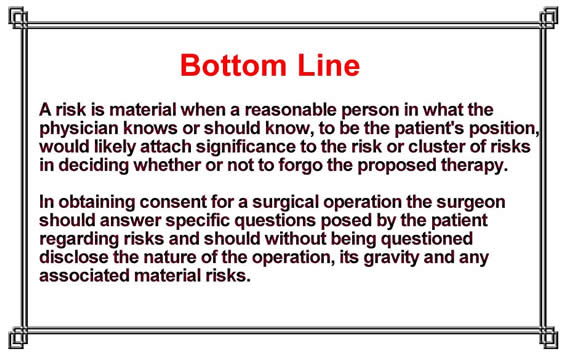Informed Consent
Material Risk
A risk is deemed "material" when a reasonable person, in the patient's position would find that information important when making decisions about medical treatment.
There is a high degree duty for elective vs medically necessary procedures.
In obtaining consent for a surgical operation the surgeon should:
1. Answer any specific questions that the patient has about associated risks
2. Without being asked disclose:
- Nature of surgery
- Gravity of surgery
- Any material risks
- Any special or unusual risks associated with that surgery
- Disclose all available therapies (result of subsequent case law)
- Discuss the consequences of not having the therapy
The concept of what information was material was developed in:
Reibl v. Hughes, [1980] 2 S.C.R. 880
The patient was 44 years old and underwent elective surgery for occlusion of internal carotid artery. He had headaches, but was otherwise well and asymptomatic. After surgery the patient had a massive cerebrovascular event (stroke) leading to right sided paralysis. Surgery had not been negligently performed.
The patient had four children and was only 1.5 years away from being entitled to a lifetime retirement pension and some extended disability benefits. The surgeon had discussed the risk of stroke in the years to come if surgery was not performed, but had not discussed the material risk of stroke associated with surgery.
The patient would not have had the surgery in his particular circumstances (only 18 months to go before full pension benefits) had he known the risks of surgery.
This trial:
- Re-enforced the idea of a patient centered standard of disclosure
- Established that it was a breach of duty not to disclose risk and not to attempt to discover what this patient deemed relevant.
- Re-affirmed that failure to meet this duty "sounded" in negligence
The patient (plaintiff) had to show that had the proper disclosures been made, he would never have had surgery and therefore the injury would never have happened.
Problem is that in general terms plaintiffs would always say in hindsight that they would not have had the procedure – and this is purely subjective.
This trial established the standard of disclosure: Reasonable person test:
- Patient centered in Canada (modified objective) – what would a reasonable person do in the plaintiff's position?
- Reasonable person in plaintiff's position would on the balance of probabilities opted against the surgery rather than having it
In the UK - The standard of disclosure is "profession centered." The level of disclosure that would be met by a reasonable medical professional practicing in the same area of specialization in question.
Subjective patient standard – determined by the specific needs of the specific plaintiff/patient at the time of the decision making.
The finding in Reibl v Hughes – was that a reasonable person in the plaintiff's position would on the balance of probabilities opted against the surgery rather than having it.
Physician should be informed about patient’s circumstances.
Level of Risk:
In this case Chief Justice Laskin stated that even if the risk was a mere possibility, it must be disclosed if its occurrence carried serious consequences (such as paralysis and death).
The duty to disclose increases:
- As incidence of risk increases
- As the gravity of the consequences of the risk becomes more serious


